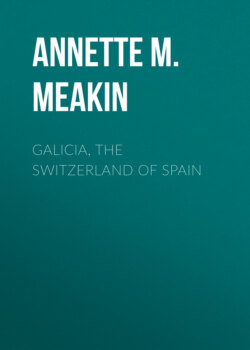Читать книгу Galicia, the Switzerland of Spain - Annette M. B. Meakin - Страница 11
На сайте Литреса книга снята с продажи.
ОглавлениеWHERE THE SIL JOINS THE CABE, ORENSE
A MOUNTAIN VINEYARD, ORENSE
PHOTOS. BY AUTHOR
and when the repentant nun returns after many years to the convent, she finds the keys where she had left them, and learned with astonishment and gratitude that no one had noticed her absence.
There are three hundred and fifty-nine Cantigas in Alfonso’s collection.
Macías (“O Namorado,” the infatuated lover) flourished in the last half of the fourteenth century, in the reign of Peter the Cruel (1350-69). Of all the trovadores of Galicia, Macías is the most popular. His fame is due to his tragic end, rather than to his merits as a poet. Professor Rennert,[81] who has recently published a monograph of Macías, does not find enough merit in his poems to account for his extraordinary fame. Macías has been extravagantly glorified alike by all the Portuguese and Spanish poets as a perfect model of true love, of love faithful even unto death. “Love alone was the cause of his death,” says Gregorio Silvestre.[82]
“El fino amante es Macías
Que con solo amor murió.”
Macías is one of the most romantic figures in Spanish literature. Rennert has spared no pains in hunting for every scrap of information obtainable with regard to this pattern lover. He has perused the Satira de Felice e’ Infelice Vida, by Pedro, Constable of Portugal, written between 1453 and 1455; also the writings of Fernan Nuñez of Toledo, which appeared in 1499, and he assures his readers that all later writers who have made Macías their subject have drawn their inspiration from these two authorities.
From the pen of Macías himself, “the martyr to Cupid,” we have only four poems that can be authenticated. Rennert has examined these with extreme care, and says that the dialect (or language) in which they are written differs in no particular from the language of the early Portuguese poets.
As we have seen, the language of Galicia separated itself gradually from that of Portugal, as a result of the union of Galicia with the rest of Spain. Each of the four poems of Macías contains a sprinkling of Castillian words.
“His story fired the popular imagination,” says Fitzmaurice Kelly, “and enters into literature in Lope de Vega’s ‘Porfiar hasta morir,’ and in Larra’s ‘El Doncel de Don Enrique el Doliente.’ ”
There are two versions of the poet’s life story. The one taken up by Argote de Molina, and, in the words of Rennert, embellished with additional touches of romance,[83] is the most popular: “Macías was born in Galicia, and was a great and virtuous martyr to love, who, being enamoured of a gentle and beautiful lady, it happened that, riding one day over a bridge together, fortune so willed it that the mule upon which the lady was riding, becoming restive, threw her into the deep water. And as that constant lover, no less determined than fired by love, and fearless of death, saw what had happened, he quickly leapt into the deep waters: and he, whose infinite longing the great height of the bridge in nowise checked, nor whom the black and angry waters made forgetful of her in whose thrall he lived, seized her, already half dead, and bore her to the white sands safe and sound, and afterwards despairing of the reward that is not denied in the end to all true and faithful lovers, she was married to another. But that constant and gentle soul, that knew no change, loved her being married as he had loved her a maid, and as the faithful lover was journeying along one day, he met the cause of his undoing, for there came towards him his lady, and in requital of his great services to her he asked her to descend from her palfry. Thereupon Macías thanked her for her bounty, and bade her remount and ride on, so that her husband might not find her there, and she having departed, her husband arrived, and seeing him whom he did not much love standing in the middle of the road, he asked him what he was doing there, and Macías replied, ‘Here did my lady set her feet, and in these footprints I intend to remain, and end my sad life.’ And her husband, wanting in every feeling of courtesy or nobility, more actuated by jealousy than by mercy, dealt him a mortal blow with his lance. There, stretched upon the ground, his eyes turned in the direction in which his lady had departed, he uttered the following words: ‘O my only lady and for ever! Wherever thou mayest be, I entreat thee to remember me, thy unworthy servant’; and, having uttered these words with a deep sigh, his blissful soul passed away.”
Macías wrote a poem in which he upbraided Love. Here is the first verse of it—
“Amor cruel e briosa
Mal aia a ta alteza,
Pois non fazes iqualeza
Seendo tal poderoso.”
And here is the fifth and last verse—
“Ves, Amor por que o digo,
Ser que es cruel e forte,
Adversario ou enemigo
Desamador de ta corte:
Al vil deitas en tal sorte
Que por prez lle das vileza!
Quen te serve en gentileza
Por galardon lle das morte.”
No doubt if he could but have foreseen his own tragic end, he would have reproached Cupid with even greater bitterness.
